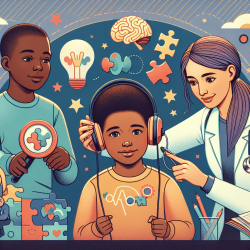As practitioners dedicated to improving the lives of children with cerebral palsy (CP), we constantly seek effective, evidence-based interventions. The study titled "Supporting Ultra Poor People with Rehabilitation and Therapy among families of children with Cerebral Palsy in rural Bangladesh (SUPPORT CP): Protocol of a randomised controlled trial" provides valuable insights that can be translated into practice to enhance outcomes for children with CP, particularly in low- and middle-income countries (LMICs).
Study Overview
The SUPPORT CP study aims to test the effectiveness of an integrated microfinance/livelihood and community-based rehabilitation (IMCBR) program. This program targets ultra-poor families of children with CP in rural Bangladesh. The study compares three arms:
- IMCBR
- Community-Based Rehabilitation (CBR) alone
- Care-as-usual (no intervention)
The intervention spans 12 months with outcomes measured at baseline, 6 months, 12 months, and 18 months. The study involves 210 child-caregiver dyads divided into 21 clusters.
Key Findings and Practical Implications
The SUPPORT CP study highlights several critical outcomes that practitioners can implement to improve the quality of life for children with CP and their families:
1. Integrated Approach
The study demonstrates that combining microfinance/livelihood support with CBR can significantly improve health-related quality of life (HRQoL), motor function, communication, and nutritional status of children with CP. For practitioners, this means advocating for and incorporating economic empowerment programs alongside traditional rehabilitation therapies.
2. Goal Directed Training (GDT)
GDT, an activity-based approach focusing on meaningful, client-selected goals, is highlighted as highly effective. Practitioners should incorporate GDT into their therapy sessions, working closely with caregivers to set realistic goals and create motor-enriched environments at home.
3. Parent Training Module (PTM)
Training caregivers in basic therapeutic skills is essential. The study used the "Getting to know cerebral palsy" PTM, which covers various aspects from positioning and carrying to communication and play. Practitioners should provide similar training to empower caregivers to support their child's development effectively.
4. Community Involvement
The study underscores the importance of community-based interventions. Practitioners should strive to create support groups and community engagement initiatives to foster peer support and collective action among families.
Encouraging Further Research
While the SUPPORT CP study offers robust evidence, it also opens avenues for further research. Practitioners are encouraged to explore the following areas:
- Long-term impact of integrated programs on socio-economic status and food security.
- Effectiveness of similar interventions in different LMIC settings.
- Potential scalability of integrated microfinance and rehabilitation programs.
Conclusion
The SUPPORT CP study provides a comprehensive framework for improving the lives of children with CP in resource-limited settings. By integrating economic empowerment with rehabilitation, practitioners can achieve significant, sustainable improvements in health and well-being. Embracing these evidence-based strategies and advocating for further research will pave the way for better outcomes for children with CP worldwide.
To read the original research paper, please follow this link: Supporting Ultra Poor People with Rehabilitation and Therapy among families of children with Cerebral Palsy in rural Bangladesh (SUPPORT CP): Protocol of a randomised controlled trial.










